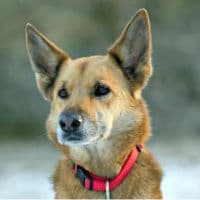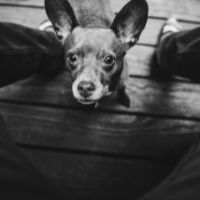FYI: If you buy something through a link on this site I may earn a commission - at NO extra cost to you.
Senior Dog Behavior
The changes in senior dog behavior can be gradual, sometimes so gradual you barely notice them. Other times things can change suddenly, even dramatically.
Some dogs stay puppy-like right up until the day they die, they have a zest for life and an iron constitution. Others age slowly and stay relatively healthy until the end.
These types of dogs don't show a lot of age-related behavior changes. However, there are many dogs whose behavior does change significantly over time, whether slowly or all at once.
Behavioral changes in older dogs are usually caused by physical or mental health conditions, or by a combination of both.
While some old dog behaviors are just a normal part of the aging process and need to be managed rather than cured, others may be a result of an underlying health condition that needs to be treated.
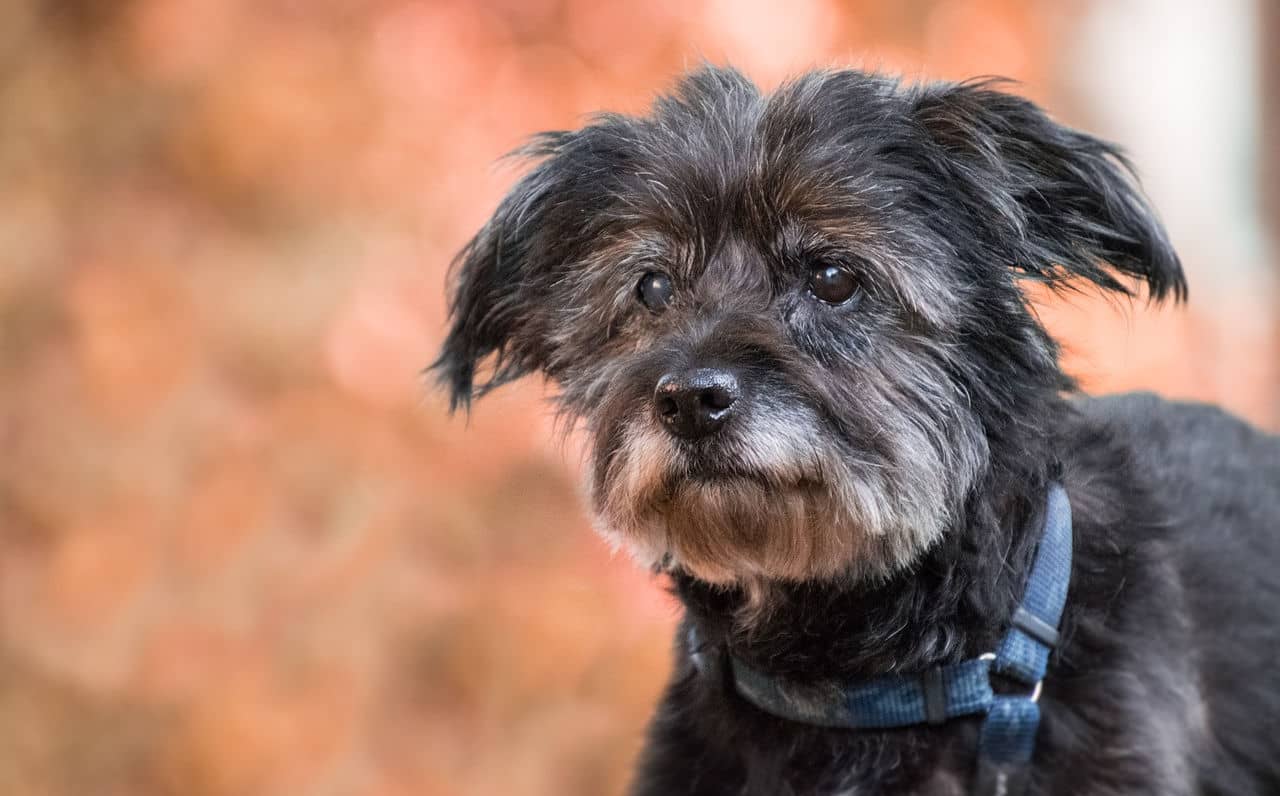
To help you figure out what's happening with your dog, this page has
information on some of the most common behaviors seen in older, or
geriatric dogs.
Old Dog Won't Eat
As dogs age their appetite can decrease as a normal part of that aging process. When this happens it usually happens gradually and you may not notice it at first.
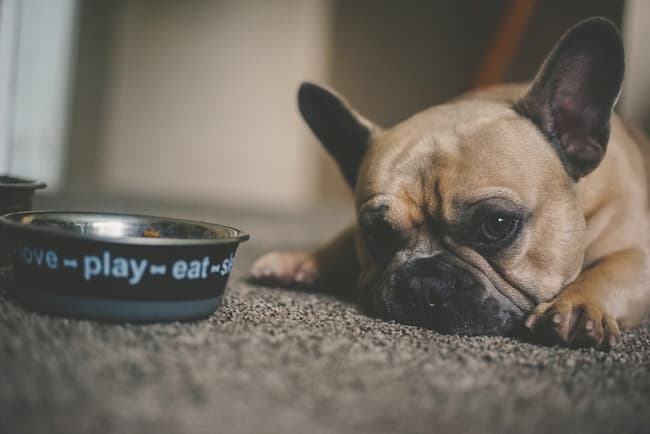
Unless he is underweight, or the loss of appetite is accompanied by other symptoms, it's perfectly possible that this is normal for your dog at this stage of his life. However, it's always advisable to have your dog examined by your vet if you notice any behavioral changes, just to rule out an underlying health condition.
For a healthy senior dog with a poor appetite, the best thing you can do is to make sure he is getting a premium, easily digestible, nutrient-dense diet so that he gets maximum nutrition from whatever he eats. You can check out my What to Feed An Old Dog page for loads more information on this.
However, if Fido suddenly loses interest in his food and has any other symptoms of illness such as lethargy, panting, distended belly, vomiting/diarrhea, excessive drooling etc., it's very important to get him to your veterinarian for an evaluation right away.
There are a whole range of health conditions which can cause loss of appetite, these include dental problems, digestive issues, heart disease, cancer and more.
You can find lots more information on this plus the top twelve tips to encourage your senior dog to eat HERE.
Why Is My Old Dog Shaking?
There are two some common reasons why old dogs shake, they include:
- Anxiety
- Pain
- Cold
- Cognitive Issues
- Arthritis or joint disease
- Incontinence
- Medication side effects
It's also possible for old dogs to develop a chronic shake for no obvious, or veterinary discernible, problem. When this happens it's called 'idiopathic old dog tremor', which basically means a tremor seen in old dogs and with no known cause.
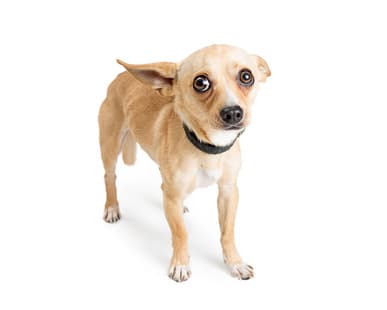
Dogs of ALL ages shake (or shiver/tremble) when they're cold, scared, anxious or in pain. It's totally normal. You may see it happen more in your older dog because:
- He has less body fat than he did when he was younger and feels the cold more
- He gets scared/anxious more quickly (poss. due to failing sight and/or hearing, or cognitive dysfunction which makes him confused)
- He has arthritis or joint problems which cause pain or joint/muscle weakness
- He has an underlying or undiagnosed condition which is causing pain or discomfort
If your senior dog is shaking you want to rule out the obvious first. Check to make sure he's not too cold (in winter a sweater, or heated dog bed, can help especially for old dogs who are underweight).
Did something frighten him or make him anxious? This could be something as simple as a change in routine, moving the furniture around, having a stranger visit (or even someone he knows) and so on.
Then check him over to see if there are any obvious signs of localized pain, swelling, lameness or injury. Signs that you need to have Fido examined by your veterinarian include:
- Lameness or weakness in his legs, or loss of mobility in joints
- Joint swelling or pain
- Swollen abdomen or pain when his belly is touched
- Tense or rigid abdomen (classic sign of pain)
Excessive shaking or trembling can also be caused by illness, injury or poisoning, so if your dog's shaking is severe, long-lasting or chronic or is accompanied by ANY other symptoms, it's important to have him examined by your veterinarian to make sure there is no internal issues or underlying problem you can't see.
Old Dog Panting
Excessive panting in older dogs (and dogs of any age) usually indicates that he's too hot, is in pain or is anxious.
If your dog is panting because he's too hot, he may also be drooling excessively and appear 'out of it' and on the verge of collapse. Heat stroke is very serious and can be fatal, so if you think this could be what's happening call your veterinarian immediately. It is an emergency.
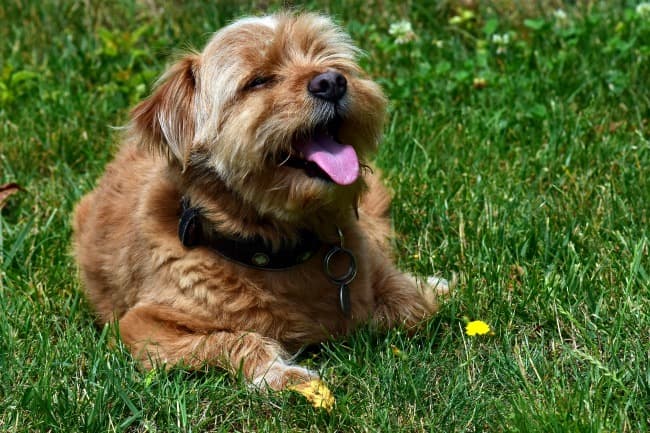
Dogs can become increasingly anxious or jumpy as they grow older. This is understandable when you realize that sight and hearing isn't as good as it once was which makes their environment unpredictable. Canine cognitive decline can have a neurological impact causing confusion which disorientation is obviously upsetting and can lead to anxious behavior. If your dog is panting because he's anxious, he might also be shaking, shivering, trembling or drooling.
Panting is also a classic sign of pain in dogs and is often accompanied by shaking.
Panting in old dogs can also be a sign of certain heart conditions, including congestive heart failure. But other more common signs of heart problems include reduced energy, lethargy, exercise intolerance, swollen abdomen, a chronic cough, pale or blue gums/lips/tongue.
If you notice any of these, whether or not your old dog is panting, have him seen by a veterinarian right away.
Old Dogs Pacing or Walking in Circles
Pacing is another sign of stress or anxiety in older dogs, and occurs for similar reasons as shaking and/or panting.
Anxiety can be caused by a number of things including physical or mental conditions and environmental changes. Check out the sections linked to in the above paragraph for more on those.
If your old dog is inclined to walk in repetitive circles, or paces a specific path or route, these things are generally caused by an obsessive compulsion and OCD behavior is related to stress or could be caused by cognitive decline (aka CCD or Old Dog Syndrome).
There are things you can do, and medications or supplements that may help if CCD is the root of the problem. Check out this section on cognitive decline in older dogs to learn more.
Old Dog Not Sleeping At Night?
There are two main causes for restlessness and night-time wakening in senior dogs:
- Canine Cognitive Dysfunction
- Pain
Canine cognitive dysfunction (aka CCD) is similar to dementia in people, and can affect a dog in a variety of ways.
Sleep disturbances are a classic symptom of CCD and can cause your old dog to sleep more, or to sleep less. To have trouble going to sleep at night, or cause him to wake up (sometimes several times) during the nighttime hours.
CCD causes disorientation, confusion and anxiety, which can increase in the evening and hours of darkness (this is called 'sundowning').
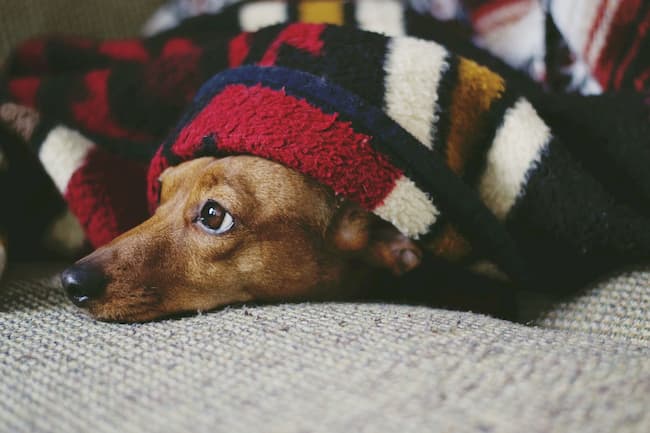
There are certain medications or supplements that can be used to help calm your dog in the evening/overnight and reduce the disruption to his (and your!) sleep. One of my daughter's had great success with a produce called ProNeurozone when their senior rescue developed CCD and night times became fraught. CBD oil for dogs can also be helpful (check out ChillPaws.com they have excellent products) and there are several prescription medications that your veterinarian could offer.
Many older dogs suffer from pain or discomfort, which can be more noticeable to them at night when there are less distractions. Dogs can be very stoic about pain and the signs that they're suffering aren't always obvious, especially if the pain is mild to moderate and has come on gradually.
If your dog doesn't have any other symptoms of cognitive dysfunction (learn more by clicking on the link under the list at the beginning of this section) but is restless at night or wakes up when he would normally sleep through, it's possible that he is experiencing pain.
In this situation it's important to get him a thorough check up by your veterinarian so that you can find out what's going on. Possibilities include arthritis, digestive issues or cancer. Tumors which grow internally often don't cause noticeable symptoms externally until they're fairly advanced. However an internal tumor can press on internal organs which leads to pain or discomfort, or cause an urge to pee/poop... anything like this is likely to interrupt your dog's sleep patterns.
Other possible causes of night time wakening and disrupted sleep patterns in older dogs can include night time seizures, heart problems, a decrease in bladder/bowel control, or even generalized anxiety .
In addition to medications or supplements, some at-home changes such as establishing a regular bedtime routine, extra late-evening (and definitely before bed) potty trips, a warm comfy bed close to where you're sleeping, and providing a night light and/or white noise can all help alleviate anxiety associated with CCD and help Fido sleep easier.
Why Do Old Dogs Breathe Funny?
Old dogs may breath differently to younger dogs, and this is usually due to illness or disease. This difference in breathing can take the form of abnormally fast, slow or heavy breathing.
Old dogs who breathe heavily, or whose breathing sounds labored (called dyspnea) could well have be suffering from fluid either in his lungs, or around his lungs/heart. In senior dogs this labored breathing is likely to be caused by heart disease (particularly congestive heart failure) or pneumonia. Other possibilities in dogs of all ages could include kennel cough, infection, injury, heartworms, tumors and so on.
Unusually fast breathing in older dogs (which is called tachypnea) could be caused by a number of different things including bronchitis, fluid in the lungs (due to pneumonia or heart disease), anemia, overheating or even anxiety.
If you notice that your old dog's breathing pattern has changed it's very important to have him examined by your veterinarian so that you can get an accurate diagnosis and start any treatment that's needed.
Old Dog Peeing In The House?
Even if your dog has been perfectly house trained since he was a puppy, it wouldn't be unusual for him to have issues with bladder and/or bowel control in his senior years.
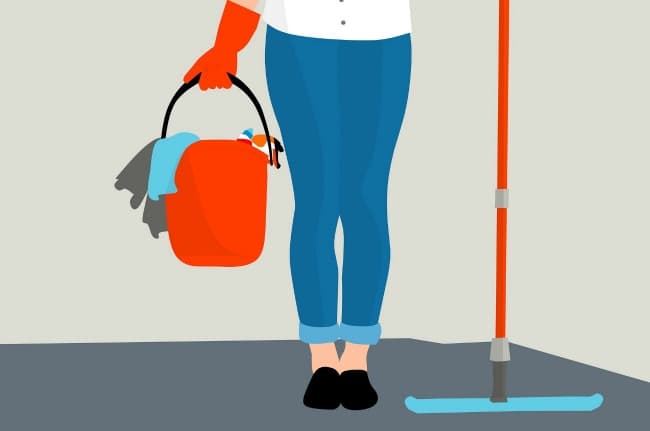
When an older dog who pees in the house (or poops for that matter) it isn't generally a housebreaking problem, it's usually because of an underlying health condition which is affecting his physical control of bladder and/or bowels.
Conditions which can cause loss of bladder or bowel control in senior dogs include:
- Urinary tract infection
- Poor muscle tone
- Kidney infection
- Falling hormone levels
- Diabetes
- Cushing's disease
- Cognitive decline
- Anxiety/stress
- Back, spinal, or neurological problems
Each of these issues may have other symptoms alongside the inappropriate potty habits...
Urinary tract infection:
- Frequent urination
- Urgent NEED to pee
- Loss of bladder control at times
- Sometimes only passes a few drops of urine
- May be traces of blood in urine
- Licking at the genitals
Poor muscle tone:
- Loss of bladder control leading to accidents
- Chronic 'leaking' or random dropping of feces
Kidney problems:
- Frequent urination
- Urgent need to pee
- Loss of bladder control
- May only pass a few drops of urine at a time
- Licking at the genitals
- May be traces of blood in urine
- Increased thirst
- Weight loss
- Lethargy
- Repeated and chronic UTI's
- Kidney stones
- Swollen belly
- Loss of muscle tone
Falling hormone levels:
- Frequent urination
- Urgent need to pee
- Cloudy urine
- Traces of blood in urine
- Frequent licking at genitals
Diabetes:
- Increased thirst
- Increased urination
- Lethargy
- Fever
- Vomiting and/or diarrhea
Cushing's Disease:
- Loss of bladder control
- Decreased appetite
- Sleep disturbances
- Behavior changes
- Shaking or panting
- Confusion
Canine Cognitive Dysfunction:
- Peeing or pooping in inappropriate places or at odd times
- Confusion or disorientation
- Sleep disturbances
- Shaking, panting or pacing
- Loss of appetite
- Behavioral changes
Anxiety or Stress:
- Loss of bladder and/or bowel control
- Shaking, panting or pacing
- Change in behavior
- Loss of appetite
Back, Spinal or Neurological Problems:
- Loss of bladder and/or bowel control
- Lameness or weakness in legs
- Distended abdomen
- Panting, pacing or shaking
- Vocalizing (whining, yelping)
- Lethargy
- Loss of appetite
As you can see, many of the same symptoms can apply to a variety of conditions, so it's important to have your veterinarian examine your dog if he is having issues with peeing or pooping indoors or in other inappropriate or unusual places.
you might also like...
- Home
- Old Dog Behavior
FTC Disclosure: Some pages on this site contain affiliate links. I may earn on qualified purchases.
